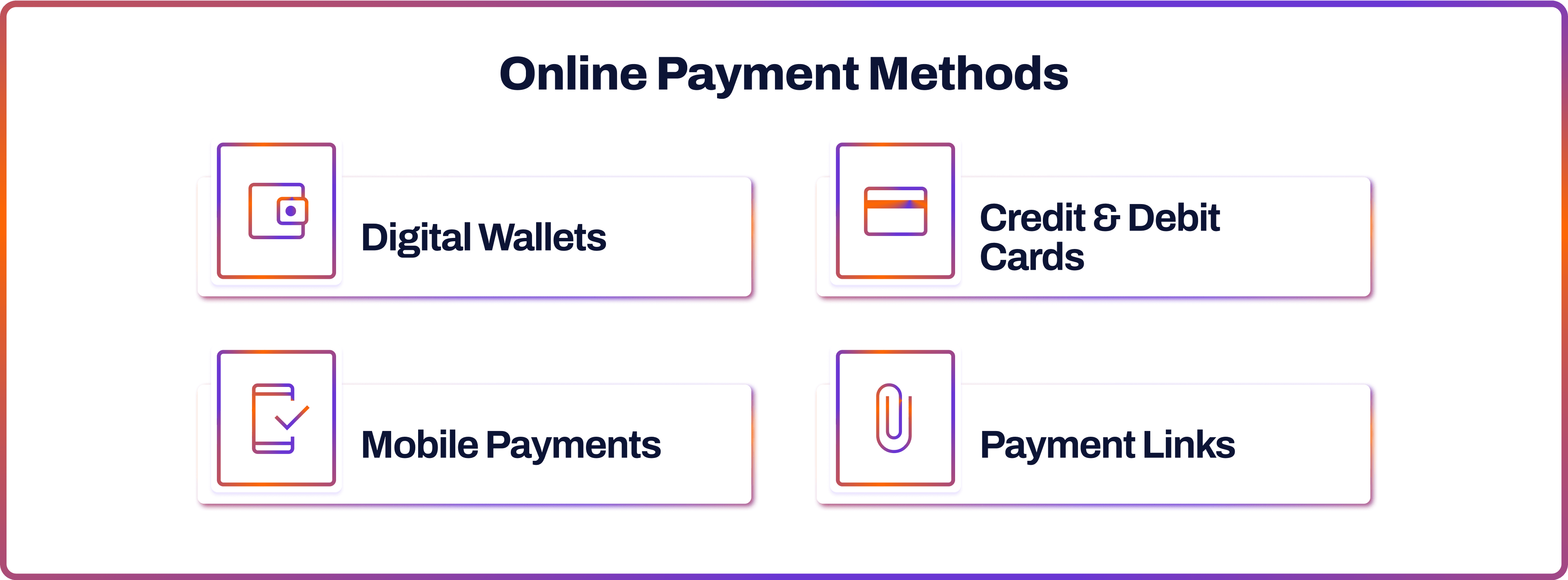
In 2025, selling online is easier than ever, but getting paid efficiently, securely, and affordably? That still takes strategy. Regardless of what online business you have, choosing the best way to take payments online is mission-critical.
Let’s break down today’s best online payment methods, how you can set up high-performing checkouts, and why open banking is becoming the most powerful (and profitable) tool in the box.
Here are your main options for accepting payments online in 2025.
Credit & Debit Cards
Credit and debit cards remain the backbone of online commerce. They are familiar, widely accepted, and support recurring payments, making them a reliable choice for most merchants. The advantage lies in their global reach and customer trust. If you’re selling internationally or targeting a broad demographic, accepting cards is essential.
Credit and debit cards remain essential payment methods for UK online shoppers, with 51% of consumers preferring to pay with cards when shopping online in recent surveys. For larger online purchases, credit cards remain particularly important as they offer additional consumer protections and the ability to spread payments.
However, cards come with drawbacks: higher transaction fees, exposure to fraud, and the risk of chargebacks. Still, they’re indispensable for reaching the masses.
- Pros: Familiar, fast, work globally
- Cons: Higher transaction fees, fraud risk, chargebacks
Read: How to Reduce Card Processing Fees as a Merchant
Digital Wallets (Apple Pay, Google Pay, PayPal)
Digital wallets are making online checkouts smoother than ever, especially on mobile. They securely store your payment details and let you pay with just a tap. In the UK, about 40% of online purchases were made using a digital wallet in 2024, and this is expected to rise to 68% by 2030.
These tools are great for boosting conversions, particularly among mobile-first users. However, they might come with extra transaction fees and aren't universally adopted across all age groups.
- Pros: Smooth mobile experience, great conversion rates
- Cons: Extra fees, not all buyers use them
- Use when: You want fast checkouts and high conversion on mobile
Open Banking (Pay-by-Bank)
Open banking (sometimes called pay-by-bank or account-to-account (A2A) payments) is quickly changing the way people pay online. Instead of using cards, customers can make payments straight from their bank accounts, using secure APIs and their bank’s built-in authentication, like Face ID or fingerprints.
And it’s catching on fast. As of March 2025, around 13.3 million people and small businesses in the UK were actively using open banking services—a 40% jump from the year before. That same month, 31 million open banking payments were made, making up nearly 8% of all Faster Payments in the UK.
So why are more people switching to pay-by-bank? It’s faster, cheaper, and more secure than card payments—plus, it’s built for mobile. It’s especially appealing to younger, mobile-first shoppers who want quick checkouts without all the hassle.
Of course, open banking isn’t the only innovation shaping the future of payments. Alternative methods like BLIK in Poland, Swish in Sweden, and crypto wallets are gaining traction in specific niches. Buy Now, Pay Later (BNPL) options are popular in retail, while direct debits are still widely used for subscriptions. Even digital coupons and in-game tokens remain big in gaming. But for fast, secure, everyday payments, open banking is leading the charge.
Why Add Open Banking to Your Checkout:
- Lower costs – No card networks, no chargebacks, fewer fees.
- Instant settlements – Get paid in real-time, not days later.
- Stronger security – Bank-grade protection and biometric logins.
- Mobile-ready – Takes users right to their banking app to confirm payment.
- Fewer drop-offs – No long forms or card details to enter.
Read: How to Choose an Open Banking Provider

How To Accept Online Payments - Choose the Right Payment System
When it comes to taking payments online, there is no perfect method that works for everyone. It really depends on how your business runs, who your customers are, and what matters most to you. But making the right choice can seriously impact your bottom line, so it’s worth taking the time to get it right.
Start with your business model. If you’re running a B2B operation, you might prefer invoice-based or direct bank transfer options. For DTC retail, fast checkouts matter, so wallets like Apple Pay or Google Pay can make a big difference in conversions.
Next, think about your audience. Younger customers expect mobile-friendly, fast, and frictionless payments. That’s where wallets and pay-by-bank options shine. If your audience is primarily in the UK, open banking is becoming a trusted and increasingly popular option.
Platform-wise, the tools you use will shape what payment systems are easiest to implement. For example, if you’re on WooCommerce, look for providers that offer out-of-the-box integrations. But if your site’s custom-built, you’ll want a flexible API provider like Noda, especially if you’re eyeing open banking to keep costs low and offer a smoother checkout experience.
And finally, it comes down to priorities. Want lower fees? Open banking is the cheapest way to accept payments online since it skips the card networks. Need speed? Instant settlement via account-to-account payments beats waiting two or three days for card payouts. Focused on security? Wallets and open banking use strong authentication, which cuts down on fraud and chargebacks.
| Your payment setup should work for you, not the other way around. With tools like Noda, powered by open banking, it’s now easier than ever to build a payment experience that’s fast, affordable, and built for the way people pay today. |
Read: How to Integrate Open Banking Payments and Payouts into Marketplace
Optimising Your Checkout Flow
Even the best payment methods won’t help if your checkout UX is poor. Remember: checkout is the final conversion funnel. A smooth flow can win sales; a clunky one kills them.
Here’s how to get it right:
Be upfront about pricing
Shoppers hate surprises—especially at the payment stage. Unexpected fees like shipping or tax are one of the top reasons for cart abandonment. Always show the full cost early on. Even better, offer free or flat-rate shipping once customers hit a certain spend threshold. A little transparency goes a long way.
Reinforce trust and security
Let people know your checkout is safe. Display SSL certificates, trust badges, and use reassuring language like “secure checkout” or “protected by bank-level security.” Open banking and wallets are both safe ways to accept payment online, using strong authentication (like biometrics and encryption), so highlight that too. Trust is everything, especially when you're asking for card or bank details. Familiar logos like Visa, Apple Pay, or a customer’s own bank add that extra bit of confidence.
Always allow guest checkout
Nothing kills momentum like being forced to create an account. Let people check out as guests, and if you do encourage sign-ups, make it easy (think “Login with Google” or social media options). Use autofill and address validation so no one has to type in every detail manually.
Keep it simple and focused
One-page checkout is gold. If you can’t do one-click, at least avoid multiple steps that drag out the process. Remove distractions like pop-ups or unnecessary links. And make sure all payment options are visible on the same page. Don’t make people hunt for their preferred method.
Design for mobile first
More people shop on phones than ever, so your checkout has to work flawlessly on small screens. Test everything on mobile: buttons should be easy to tap, forms should bring up the right keyboard (numeric for CVV, for example), and the layout should stay clean and responsive. Mobile-unfriendly checkouts quietly kill more sales than most merchants realise.
Clarify returns and refunds
Even though it’s not strictly about payments, return and refund policies matter here. Shoppers feel more confident completing a purchase if they know they can get their money back. A simple line like “30-day money-back guarantee” near the payment button can make a difference.
Offer the right payment options
Don’t overload the page with every possible method. Show the ones that make sense based on location, cart size, or device. For example, open banking or wallets might be a better fit for small mobile purchases, while card options can stay visible for larger totals. Use saved preferences or cookies to personalise the payment view where possible.
So, what is the best way to receive payments online in 2025?
There’s no single “right” payment method, but there is a smarter way to do things. The easiest way to accept payments online and the best approach is one that adapts to your customers’ preferences while making life easier for your business. Whether your shoppers prefer cards, wallets, or direct bank payments, a smooth checkout experience builds trust, boosts conversions, and reduces friction at the most critical moment.
The challenge? Most payment providers are either too expensive, too slow, or too rigid.
That’s where Noda comes in.
Noda gives businesses a modern, cost-effective way to accept online payments without the usual pain points. Say goodbye to high card fees, clunky integrations, and long settlement times. With Noda, you get everything you need to accept electronic payments and offer a checkout experience that’s fast, flexible, and built for growth.
Here’s what sets Noda apart:
- Pay-by-Bank – Let your customers pay directly from their bank accounts, securely and instantly. Our Open Banking API connects you to 2,000+ banks across 28 countries in the UK, Europe and beyond, and supports multiple currencies. No cards, no middlemen and no delays, with fees as low as 0.1% per transaction.
- Still Need Cards? We’ve Got You – Prefer to keep offering credit and debit cards? Noda’s Card Payments API gives you smooth UX, smart routing, and fast setup—all with transparent pricing.
- Built-In Flexibility – Use no-code tools like instant payment links and branded checkout pages, or plug Noda into eCommerce platforms like WooCommerce, Magento, OpenCart, and PrestaShop. Plus, every merchant gets a dedicated personal manager to help tailor the setup and ensure everything runs smoothly from day one.
- Developer-Friendly API – Want to go custom? Noda’s well-documented API lets you create fully tailored payment flows and embedded experiences with ease.
- All the Essentials
- Direct access to thousands of banks
- Hosted checkouts or API integrations
- Lightning-fast payouts
- Automatic reconciliation
- No hidden fees or rolling reserves
Consumers expect seamless, secure, and mobile-friendly checkout experiences. And businesses want payment tools that don’t chip away at their margins. Noda delivers both, with the flexibility to scale alongside you.
FAQs
What is the best way to accept payments for small businesses?
For small businesses, the most effective approach to accept money online is to integrate a trustworthy payment processor that offers various payment methods.
What is the cheapest way to accept credit cards online?
For businesses looking for the best way to accept credit cards online, it's important to find a payment processor that offers low transaction fees and minimal setup costs. Comparing different processors is key to finding one that balances affordability with reliable service.
Which payment option is not accepted online?
Online transactions typically require electronic payment methods such as credit cards, digital wallets, or bank transfers. Physical checks and cash are not commonly accepted since they are not compatible with the digital nature of online payments.
Latest from Noda

Top Payment Methods in Austria: How to Accept Payments Efficiently in 2026

GoCardless Review 2026: What Merchants Need to Know

AIS vs PIS in Open Banking: What’s the Difference & When to Use Each


